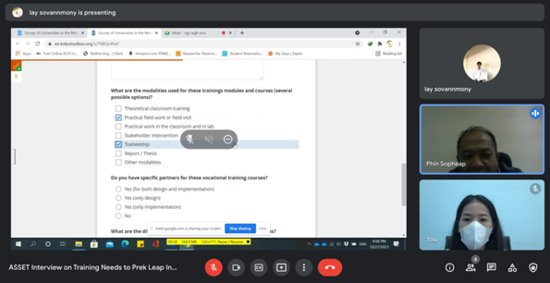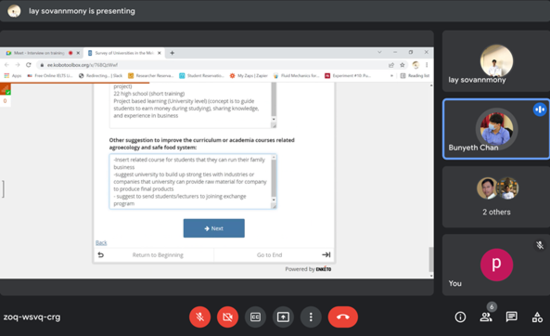Preliminary Outcomes from the Training Needs Assessment
Training needs assessment for university
This assessment aimed to identify the gaps between universities and various stakeholders (ASSET partners, ALiSEA members, and flagship stakeholder) and to evaluate training needs on agroecology and safe food systems to improve the capacity building of stakeholders. The training needs assessment for the seventeen Agricultural Universities in Cambodia, Laos, and Vietnam was conducted through online Kobo Toolbox and interviews. The online survey had questions on existing topics related to agroecology and safe food systems in the curriculum and future needs of training topics on curriculum/academic courses, vocational training, soft skill, and e-learning. According to the survey result, for curriculum and academic courses food system, value chain, and market were identified as the needs from the Cambodian universities. For the Vietnam and Laos Universities, the livestock system was identified as a need for the academic courses. For vocational training, benefit analysis and value chain and marketing for agricultural products came as a topic of interest from the Cambodian and Vietnam Universities, respectively. In Laos, management of the smart farming system, pig, goat, chicken raising and animal breeding were identified as the vocational training topic. For e-learning, cropping systems, organic agriculture, and livestock system were identified as the needs in the region. Functional capacity needs (soft skills) identified from the assessment survey are marketing, project management, entrepreneurship, communication, and project proposal writing.
Training needs assessment for ASSET and ALiSEA members
Under the category of ASSET and ALiSEA members, the aim was to identify training gaps for capacity building promotion. Livestock and crops-livestock integration was the identified training gaps in Cambodia. The identified gaps of technical training topics for Vietnam were sustainable resource management, landscape management, and sustainability impacts assessment. The topics with high demand among all partners were the food system, value chains and markets, and gender equality. For soft skill training, communication and awareness, advocacy skills, and entrepreneurship were identified as the needs. For E-learning, existing resources in Cambodia as provided by the ASSET partners and ALiSEA members included conversation in agriculture, agriculture services, and agroecology transition. While existing resources for E-learning in Laos and Vietnam are related to food safety, the focus of E-learning topics for European partners address gender issues. However, in general, training session topics focussed on identified needs for E-learning are broadly related to livestock, agroecology crop production, youth communication and awareness.
Training needs assessment for flagship stakeholders
The training needs assessment for flagship stakeholders is an on-going process of evaluation and it is conducted at the country level (Cambodia, Laos, Vietnam). The purpose of the training needs assessment is to identify technical and soft skill training topics that are needed by flagship stakeholders (e.g famer, agriculture community, extension agency, etc.). The results from the assessment will be used for the development of a training program under the ASSET project. This will further be useful for supporting the sustainability of agroecological practices.


